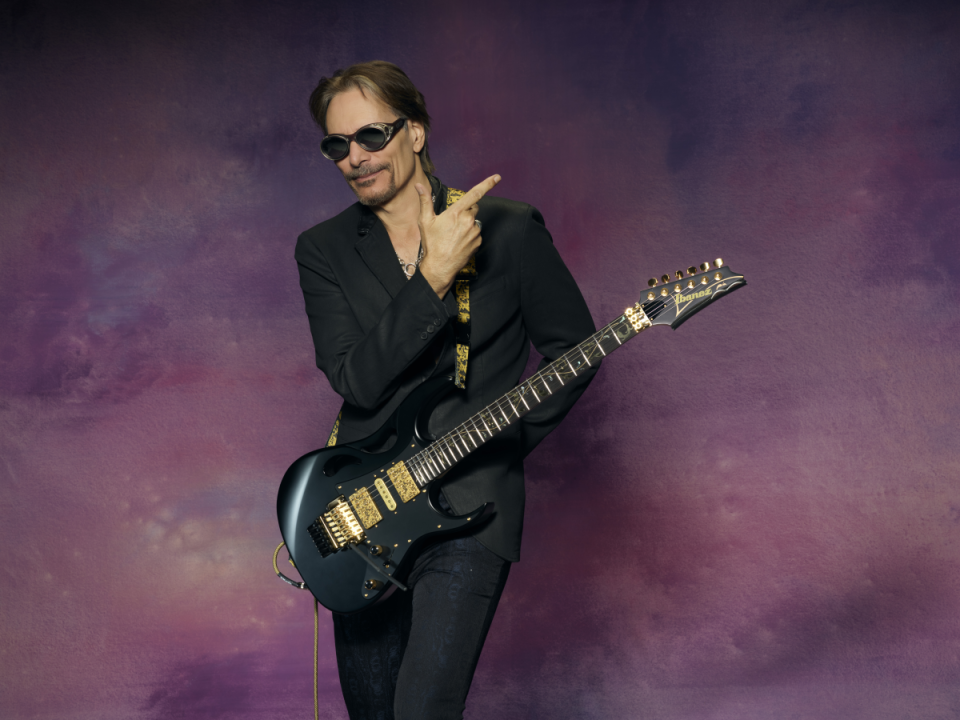Steve Vai talks Joe Satriani relationship, music theory and more ahead of Cincinnati show
- Oops!Something went wrong.Please try again later.
- Oops!Something went wrong.Please try again later.
Guitar shredding legends Steve Vai and Joe Satriani return to Cincinnati on their first co-headlining tour Friday. Both are known for their virtuosic tapping, picking techniques and dedication to the craft, with in-demand masterclasses and rigorous practice schedules.
I recently spoke to Vai about the pair’s indelible musical relationship, his early career working for Frank Zappa and the importance of music theory to his art.
Q: You just came out with a single last month and with your album, “Gash,” last year. They touch on different stages in your career – '80s arena rock to the classical concerto-like pieces. Do you have a favorite style of music to play?
Vai: I follow my instincts, and I don't question them. It’s a feeling of enthusiasm over a particular idea. So I've always loved composing. I started studying that when I was a child. Through the years I've composed a lot of music. Right after the pandemic I recorded four hours of my orchestra music in three weeks with the Metropolitan Orchestra in Holland, and two weeks with the Tampere Philharmonic in Finland.
The “Gash” record was another one of those energies in me that just was filled with enthusiasm. I recorded it in a week, two weeks. My friend who sang, Johnny "Gash" Sombrotto, was killed in a motorcycle accident. That was 31 years ago. I put the record on the shelf and released it 31 years later.
If you ask me my favorite thing, it might be a toss-up between just sitting and composing or being onstage and playing my music. Now it's being onstage with Joe. We just keep eclipsing ourselves.

Tell me about your relationship with Joe. I understand he was your guitar teacher, and you do master class tours now. Do you have anything to say about what an important quality of a music teacher is?
I grew up on Long Island, in this little town called Carle Place. Joe Satriani, we went to the same schools our whole life. He was four years older than me, so he was one of the big kids. We all loved him, and he was a great guitar player. I was 12 years old when I started taking lessons with him. I took lessons on and off for some years, and then he moved to California.
All through these decades, we've been joined at the hip because our solo music falls in a similar genre. We've toured together with G3. We've played on records together, but we never actually sat down and wrote music together, and we never actually toured just the two of us.
I saw this recent clipping, an interview from around 1990 with me and Joe in a guitar magazine. They asked us, "Are you ever going to make a record together?" The answer was, "Right now, we're pretty embroiled in our solo careers, but a record feels like it’s going to happen one day." I even mentioned we should call it "The Sea of Emotion" because it came up during that interview.
It's reflective of a place that we all used to hang out. A giant field in between all the schools. We’d sit there, teenagers, and get in a lot of trouble. Joe and I would go there after lessons and sit and overlook this giant field, and talk about all those things that teenagers talk about – discovering the universe and the meaning of life.
When Joe and I decided to do this tour together, the idea came up: We should maybe have some new music. The next thing you know, I get these two beautiful tracks from Joe. I started working on them, and they were called "The Sea of Emotion, Part One and Part Two." I had a recording from a lesson with Joe when I was 13. He showed me this riff, and he was experimenting with some cords, and we recorded it. I thought it’d be a great idea for part three. So there's actually a little piece of teenage Steve and Joe jamming, and then it breaks into part three of the song. It was so much fun, we decided, "Let's do a whole record."

One of your first big jobs was playing with and transcribing Frank Zappa's music. You went to Berklee, Boston. That's a very cerebral path to understanding music. What would you say is the importance of doing that intellectual skill work, and how does that fit in with the emotional aspect of your art?
Well, it's really up to the individual. If their interest is in understanding high-information music or not. I was always interested in the language of music. And I wanted to understand my guitar. So for me, Berklee was appropriate. Even more so were the music classes I was taking in high school from seventh grade through 12th grade with this guy, Bill Westcott. He was a savant. He taught me everything about music theory. When I was taking lessons with Joe, it showed me how to take all that music theory that I was using to compose and apply it to the guitar.
But the thing is, it's a very common question that young musicians have. "How much cerebral information should I have?" I always say, the most important thing is your ear. How do you listen to music? How do you hear yourself? How do you hear what it is you want to do? That's how you manifest it.
For a person like myself, music theory has come in handy because it can open up doors in the melodic, harmonic realm. But you're only going to be able to retain music theory if you're interested in it. And if you're not, you probably won't retain it, and you may not use it. Having said that, it's a good idea to at least understand basic music language. If you're a guitar player, you got to know all the notes, chords, scales, just basic stuff.
With the rise of hip-hop and electronic-based music, what do you think the role of the guitar and acoustic instruments in general is in modern music?
Well, the guitar is still a very healthy ingredient in even pop music. You get Ed Sheeran, and even Taylor Swift is playing a guitar. As far as intense playing, it's just not accessible to the masses, usually – the evolution of shred, so to speak. There's a very healthy underground movement of young artists that are just hitting the scene that are doing incredible things on the guitar. Their chops, their ability to navigate the neck is higher than I've ever seen. But it’s relatively niche.

You're touring later this year, playing ‘80s King Crimson tunes with Arian Belew, Danny Carey and Tony Levin.
One of the groups that I loved in the '80s was King Crimson. It's four guys, and they just recorded live. They'd do tracks in one take, and if they didn't like it, maybe they'd do it the next day. It's rare. Now that I'm looking under the hood at all this Crimson music from that period, it is so brilliant. I've never seen or heard anything like it.
Joe Satriani & Steve Vai: Satch Vai U.S. Tour
When: 8 PM, Friday, April 19.
Where: Andrew J. Brady Music Center, 25 Race St., Downtown.
Tickets: $49.50-$69.50.
This article originally appeared on Cincinnati Enquirer: What legend Steve Vai thinks of the guitar's role in music today

